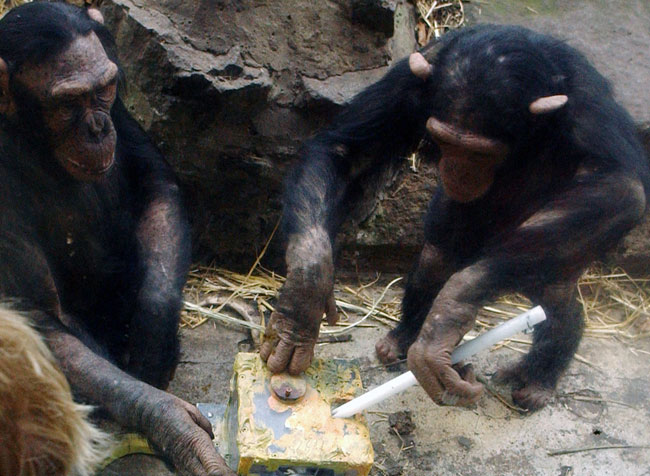Fair Trade: What We Know That Chimps Don't

Humans might be the only primates that truly understand the value of a good trade. Psychologists Sara Brosnan and Michael Beran of Georgia State University's Language Research Center recently did an experiment with chimpanzees to see if they were interested in trading, and it turns out they were, sort of. The chimps were given tokens that symbolized food, and they easily traded with humans for the real item. They also exchanged tokens with other chimps, but only if the researchers were there encouraging them. In other words, the researchers think — and in spite of all the human-like traits other primates are known to possess — trade is more a human activity. The first requirement of a trade is to covet something and then figure out what you might have that's of value to the other party involved. Monkeys and apes know all about this. Primatologists Dorothy Cheney and Robert Seyfarth of the University of Pennsylvania have shown that African vervet monkeys are very good at giving and getting in equal measure with their troop mates. For example, a vervet might groom someone in the morning and then expect, and receive, support from that monkey during a fight in the afternoon. Apes also know about that kind of tit-for-tat. Female bonobos have been known to trade sex for food. Also, behavioral ecologist Christina Gomes of the Max Planck Institute for Evolutionary Anthropology in Leipzig, Germany, found that grooming among chimps in the Tai Forest, Cote D'Ivoire, is reciprocal, and like vervets, that reciprocity often happens many days later. So in both apes and monkeys, there is the capacity for keeping track of what was traded and when. But humans run their lives by trade. No one knows exactly when this ability blossomed into its present state, but surely giving and getting is a strong part of our social heritage. Groups only work as cooperatives, and so our hominid ancestors must have been intensely using that system ever since we separated from apes. Our interpersonal relationships are notoriously complex, and full of rewards for the generous as well as retribution and justice for the cons. We can spot a cheater a mile away, and those sorts of people are often ostracized, a clear lesson in how the system of exchange works within a group. Once humans spread across the globe and settled down, they began to trade everything across cultures — women, food, weapons, and every cultural artifact that could be used for barter. Today, exchange of goods or favors is the social and economic glue that keeps many a society together. Just take a look at Craigslist to see how this system has flourished in our modern times. It's just so compelling from a human point of view. And that's why the researchers argue that a reliance on trade is a bigger deal for humans than chimps. But perhaps the lackadaisical performance of the Georgia chimps is not so much about not being into the act of trading, but that the value of the tradable item was simply not so important from a chimp point of view. After all, they live in captivity and food is not exactly a scarce resources. But grooming, hey, that's worth the literal back-and-forth of "I'll scratch your back and your scratch mine" to even those chimps. And so they do.
Meredith F. Small is an anthropologist at Cornell University. She is also the author of "Our Babies, Ourselves; How Biology and Culture Shape the Way We Parent" and "The Culture of Our Discontent; Beyond the Medical Model of Mental Illness." Her Human Nature column appears each Friday on LiveScience.
Get the world’s most fascinating discoveries delivered straight to your inbox.


